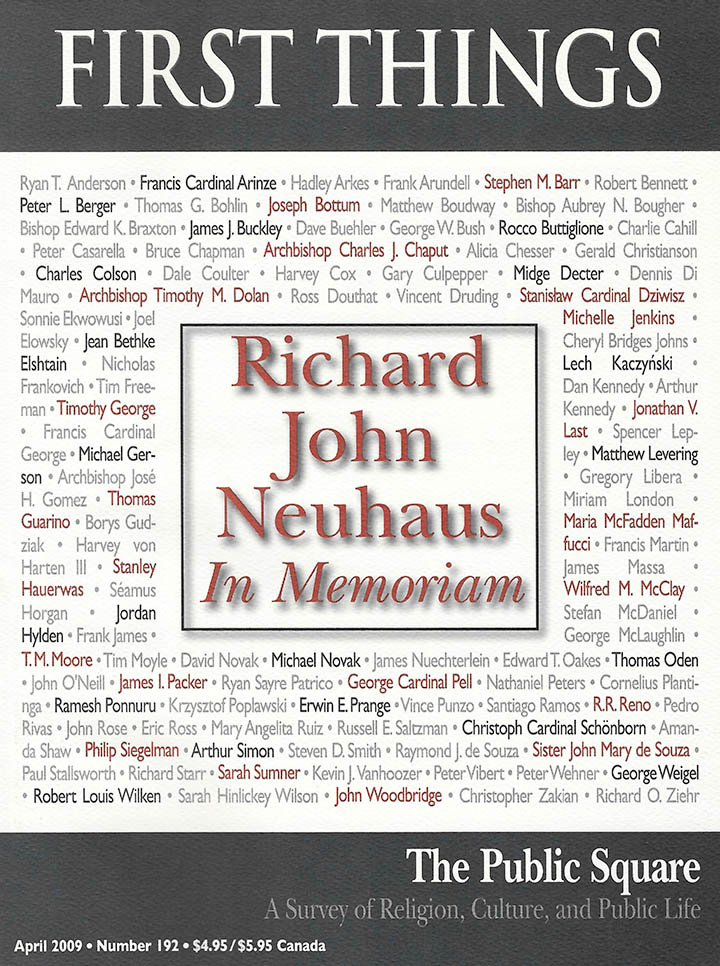On occasional pilgrimages to visit Richard John Neuhaus at the First Things office on Fifth Avenue, I was one of the thousands treated to a few minutes of learned, boisterous, civil conversation. Since I had no insight to offer the public intellectual who already had everything, we talked of politics, my profession at the time. He was politely skeptical of my enthusiasm for various projects of social reform, having (I am sure) seen such zeal before. I left little impression on him. But I now wish I had told him of the imprint he had left on me.
As a young evangelical in the late 1970s and early 1980s, interested in history and inclined toward politics, intellectual models were hard to come by. Being a child of the Reformed tradition, I was exposed to the thought of Francis Schaeffer, who offered an appealing message of cultural engagement after fundamentalism’s long, withdrawing roar in the early twentieth century. But Schaeffer’s political views eventually veered toward anger. I read and respected Russell Kirk. But over time I found much British-influenced conservatism to be historicist, suspicious of the American creed, dismissive of enthusiastic religion, and enamored of its own irrelevance.
So reading The Naked Public Square in the mid-1980s was like finding a home. Here was someone who viewed religiously informed social activism as an expression of, not a violation of, democratic ideals. Someone who saw emerging evangelical political involvement as a contribution”but urged the faithful to adopt a universally accessible moral language. Someone who asserted that American history is unimaginable without political commitments rooted in faith”though some tried to imagine it. Someone who warned that such secularist dreams did not result in tolerance or neutrality, but rather in the outlawing of the moral basis for law itself.
Fr. Neuhaus set out an ideal: a reasoned public discourse necessarily informed by religious and moral values, but requiring believers to recognize that their strongest convictions might not prevail on this side of eternity.
In my first job interview after college, I discussed The Naked Public Square at length with Chuck Colson, who had been impressed by the book as well. It seemed to seal the interview. The respect between Chuck and Fr. Neuhaus eventually came to symbolize a new era of evangelical-Catholic engagement, one of the largest political and religious developments of our time. Neuhaus”along with Michael Novak and George Weigel”explained and interpreted the teachings of John Paul II for many young evangelicals, who learned much about the splendor of truth and the gospel of life.
Fr. Neuhaus modeled the proper and principled way to make a pro-life argument”not in language of moral judgment but of social inclusion. He saw the pro-life moment as the natural extension of the civil rights movement and its promise that the circle of legal protection in America should always expand. Having been faithful to that promise at Selma, he thought it still worth keeping.
From Fr. Neuhaus I gained a more systematic respect for the “mediating structures” that stand between government and the individual”institutions such as families and voluntary associations that limit the ambitions of government and deliver individuals from isolation and selfishness. To Empower People , coauthored with Peter Berger, made a brief, landmark case for the legal protection of private associations and their incorporation in public policy.
Some of us working on Capitol Hill began asking the question: Might it be possible to expand the scale of antipoverty charities”closer to people and to problems than government bureaucracies”without changing the distinctive nature of those institutions? This approach made a few converts, including Senator Dan Coats, Mayor Steve Goldsmith, and Governor George W. Bush of Texas. If I and others became enthusiastic about the political implications of subsidiarity, Fr. Neuhaus had only himself to blame.
And in later years, I learned something of death from Fr. Neuhaus, who had encountered it so closely he could smell its breath. He called it “the most natural of things and the destruction of everything that is natural and right.” His own passing seemed neither natural nor right. But he believed that all the fear and indignities and destruction would somehow end in glory. And so we try our best to believe, until faith becomes sight.
Fr. Neuhaus lived a life rich in achievements. One of the smallest was this: He introduced a young evangelical to John Courtney Murray, to John Paul the Great”and to himself. It changed my life, and I should have told him.
Michael Gerson, a former speechwriter for President George W. Bush, writes for the Washington Post and Newsweek.

